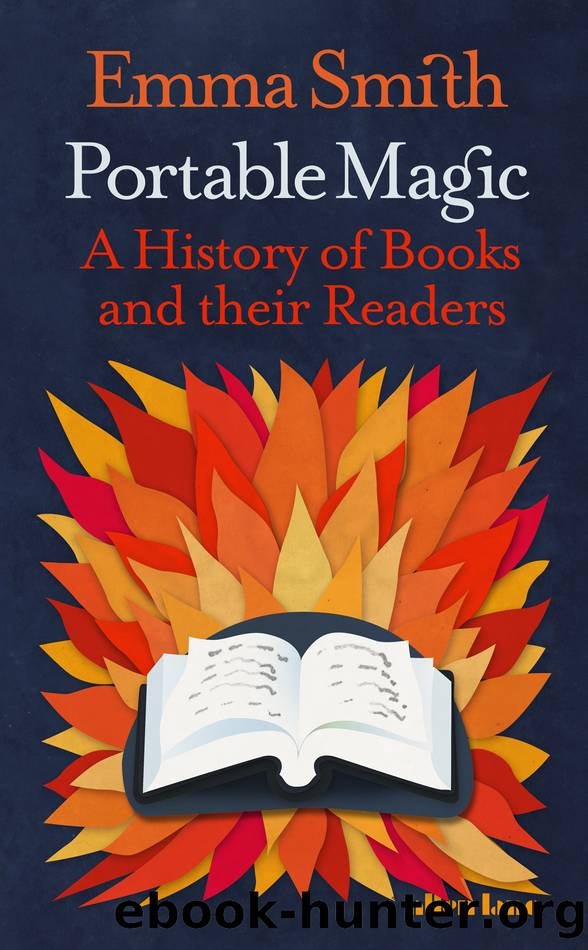Portable Magic by Emma Smith

Author:Emma Smith [Smith, Emma]
Language: eng
Format: epub
ISBN: 9780241427286
Publisher: Penguin Books Ltd
Published: 2021-05-06T00:00:00+00:00
As the case of Lady Chatterleyâs Lover shows, efforts to ban books are good for sales. Surely at least some of the Oklahomans who in 1961 encountered the group Mothers United for Decency, who used a trailer full of objectionable books dubbed a âsmutmobileâ to draw attention to their moral crusade, must have used this as a handy curation of the titles for future acquisition, just like those Protestant librarians piggybacking on the Catholic Index. The academic Indologist Wendy Doniger observed that the lawsuit against her book The Hindus: An Alternative History (US publication 2009, Indian publication 2010) and its publishers, Penguin India, had the effect of making it an unexpected bestseller. The allegation that the book contained âdefamatory, derogatory, insulting and objectionable passages referring to freedom fighters of Indian National movement and also to Hindu Gods and Goddessesâ was initially challenged by the publishers, but eventually Penguin agreed to cease publication. Their commitment to pulp the remaining copies was, however, never actioned, because readers alerted to its existence by the controversy flocked to buy them up. If the aim was to restrict circulation of Donigerâs book through an appeal to the Indian Penal Code, it backfired. Doniger and her book went from quiet academic niche to front-page news, with sales to match.
Accounts of book censorship â including this one so far â are often comfortably, complacently distanced, by either history or geography. Censorship is the work of Chinese bureaucrats, or the early modern papacy, or Indian religious zealots, or the English legal system before the dawn of the permissive society, with its quaintly patronizing claim to protect the innocent. Freedom of publishing has become an iconic Western value and, with it, the reassuring fiction that censorship is done by them, not us. However, it is striking to acknowledge that the late twentieth centuryâs hotspot for literary censorship is not, as might perhaps be expected, in Iran, China or Georgia, but in the American schoolroom, one of the most contested of modern bookscapes.
Debates about the books thought unsuitable for juvenile readers have coincided with the development of a new genre directed at them and their concerns: Young Adult (YA) fiction is appropriately named because it often deals with issues of sexuality, relationships and identity. S. E. Hintonâs 1967 novel The Outsiders is often credited with inaugurating the genre and, alongside it, an ongoing and fractious reception by education boards. By the 1980s, another coming-of-age novel, J. D. Salingerâs Catcher in the Rye, had the dual distinction of being both one of the books most likely to be taught in public schools and the most frequently censored book in American schools and libraries. Censorship had dogged the novel since its publication, when the National Organization for Decent Literature, organized by Catholic bishops, attempted to have it banned. A perennial complaint was about the language (â237 goddams, 58 bastards, 31 Chrissakes, and 1 fartâ, as one complaint enumerated with more outraged mathematical bathos). Its notoriety was amplified by its apparent role in the murder of John Lennon.
Download
This site does not store any files on its server. We only index and link to content provided by other sites. Please contact the content providers to delete copyright contents if any and email us, we'll remove relevant links or contents immediately.
| Booksellers & Bookselling | General |
| History of Books |
4 3 2 1: A Novel by Paul Auster(12358)
The handmaid's tale by Margaret Atwood(7735)
Giovanni's Room by James Baldwin(7307)
Asking the Right Questions: A Guide to Critical Thinking by M. Neil Browne & Stuart M. Keeley(5745)
Big Magic: Creative Living Beyond Fear by Elizabeth Gilbert(5731)
Ego Is the Enemy by Ryan Holiday(5398)
The Body: A Guide for Occupants by Bill Bryson(5067)
On Writing A Memoir of the Craft by Stephen King(4921)
Ken Follett - World without end by Ken Follett(4711)
Adulting by Kelly Williams Brown(4556)
Bluets by Maggie Nelson(4538)
Eat That Frog! by Brian Tracy(4503)
Guilty Pleasures by Laurell K Hamilton(4428)
The Poetry of Pablo Neruda by Pablo Neruda(4083)
Alive: The Story of the Andes Survivors by Piers Paul Read(4013)
White Noise - A Novel by Don DeLillo(3995)
Fingerprints of the Gods by Graham Hancock(3980)
The Book of Joy by Dalai Lama(3963)
The Bookshop by Penelope Fitzgerald(3829)
